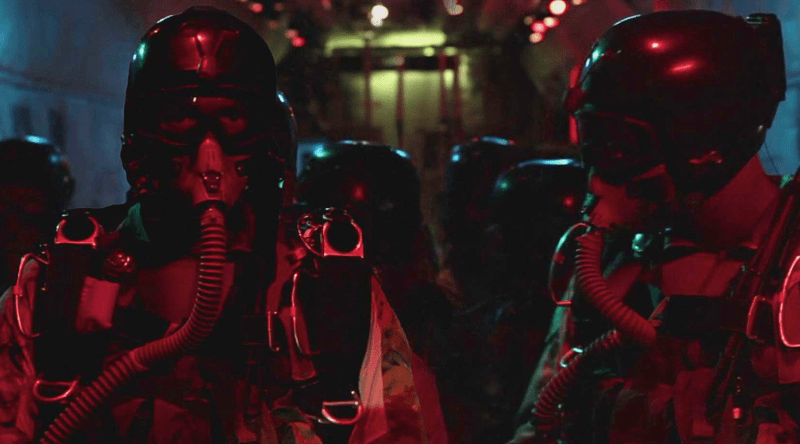The big engines roared and strained as we climbed up to 15,000 feet over the Arizona desert. The back of the C-130 was splashing a dim red everywhere. The red lights were used at night with no night vision, and green IR lights were used when teams were kitted up with night vision goggles (NVGs).
No goggles for us tonight. We’d jump from 15,000 feet with full combat load. Later, as I’d descend to the desert floor under the canopy, I’d trade the devil my left nut for a pair of NVGs.
Helmet check, oxygen tank, and mask check, front-mounted combat backpack clipped onto our parachute harness secure, check.
The jumpmaster signaled us to get up, the light turned green on the ramp and we got the signal to go. My jump stick waddled to the back like ducks into a pond, only our pond was the black of night.
No moon, high overcast, and no starlight meant the dark of a well diggers arse hole for me and the team.
Off the ramp we waddled out one after the other and dove into darkness.
The forward airspeed of the C130 helped to push you into a stable flying position as we dove out. Small chem lights marked our bodies to identify our stick and take up falling V formation.
I counted eight and slid into my spot near the rear as we descended towards the earth at over 100 miles per hour.
Altimeter 10,000, 7,000, 6,000… slight turn to 35 degrees outward, my hands slid back a bit, legs extended, and I made like I was hugging a barrel. This slowed my descent and I started tracking away from my team.
One one thousand, two, three, four, altimeter check, look, grab, pull with right hand and slightly extend my left arm out to compensate for the pull while falling against the wind.
With a swift and silent snap my canopy was open.
I counted eight again and took up formation to land at our designated spot. But, a small problem had occurred.
I was now at 4,000 feet and still couldn’t see the ground. Three thousand, 2,000, and still nothing but darkness all around me. It was like one of those dark sensory deprivation chambers I’d read about only this chamber had a landing to make.
Passing through 2,000 feet I was starting to line up into the wind with my wrist compass. It was here that I would have made my deal with the devil himself.
One thousand feet I turned base, pulled my quick released to drop my combat pack 10 feet under me, and turned final into the wind and still couldn’t see the ground for shit.
F**k me.
In this situation I knew what to do: feet and knees together, pull my risers to 50 percent, and take it like a man.
“Are my risers at 50 percent? They feel like 30 percent. Shoot, if I pull too much riser I’ll stall my canopy and fall a few hundred feet to certain death, or worse, a wheelchair for life. Maybe a little more riser,” my mind raced as I had this conversation with myself BAM!…. Conversation over.
I felt like that scene in Stephen King’s Misery where that crazy bitch takes a sledgehammer to ankles and hobbles the famous author Paul Sheldon for misbehaving.
The pain was worse in my right leg. I thought it was broken, had a moment with myself, and tried to stand up.
Ok, good, I can put weight on it. It’s not broken but damn me to hell if it didn’t feel like it. It was the kind of sharp turned dull pain you feel when your teeth are pulled in the Navy while you’re awake and the meds wear off after the procedure.
I laid there for 10 minutes taking the pain in like a meditating swami.
Time to go. I grabbed my kit, and limped to the faint lights of the drop zone truck.
Four more night HALO jumps to go.
“Take some motrin and hydrate,” the medic said as he gave me a devilish smile. Some medics make you feel good and some make you want to get the hell out of there quick. This was the latter.
I nailed the rest of my jumps that week like a precision stealth bomber and touched down like a feather on a baby’s ass each time.
Years later I’d find myself looking at an X-ray with an orthopedic surgeon at NYU in Manhattan.
“See that white chip above your right hip? That’s a piece of bone floating because you chipped your hip socket during that landing in 2003.”
The VA hospital refused to give me a service-connected injury for three years. I just got notice last week that they finally acknowledged (after more than four doctor letters, MRIs, and x-rays) the service-connected injury.
One small victory for me but I couldn’t help but wonder about the guys that really need help and don’t get it.
“The Only Easy Day Was Yesterday.”
